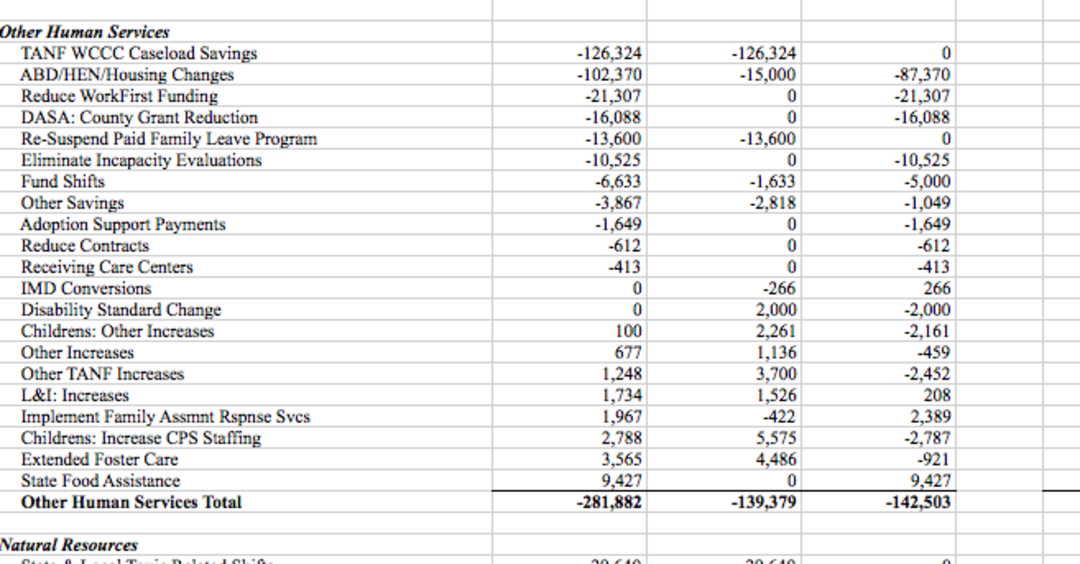Morning Fizz: "Education by Starvation"

1. SIDE-BY-SIDE BUDGET COMPARISON
Despite all predictions to contrary, the Majority Coalition Caucus, the group of 23 Republicans and two Democrats who control the state senate, have remained unified all session.
And this weekend, the MCC passed an austere, no-taxes budget, abiding by their gameplan once again, rejecting the Democrats' offer to slash an original play for new revenue by $700 million and spend about $1 billion less. But the Democrats still wanted to close some tax loopholes and put more money into social and human services. The MCC balked.
The result? Here's a side-by-side comparison: the Democrats put $33 million more into higher-ed financial aid; $27 million more into early learning; $17 million more into longterm care and mental health; and $142 million more into other human services such as $87 million more into the Housing & Essential Needs program and the Aged, Blind & Disabled program.

And if you don't count the Democrats more generous offerings like $2.4 million more into Temporary Assistance to Needy Families (TANF), $2.7 million more into child protective services, $27 million more into child care and early learning, and again, $9 million more in to food assistance, the Republicans and Democrats put about the same into basic K-12 education; the Republicans put more straight in to the K-12 account, about $173 million more, but the Democrats' add nearly $200 million into other education services, such as all-day kindergarten, with money from closing tax loopholes.
The Republicans put about $73 million more into higher education, but, again, the Democrats put $33 million more into higher ed financial ed.
The Democrats also put $30 million more into natural resources and $10 million more into corrections and criminal justice.
Overall, the Republicans cut about $320 million more from the budget.
2. REPUBLICAN "MUST HAVE" POLICY BILLS
Meanwhile, largely along party lines, the Majority Coalition Caucus passed three policy bills this weekend that they've prioritized as must-haves for any budget agreement: One, a workers' compensation reform bill, would make it easier for companies to reach one-time settlements with injured workers rather than sticking to state-dictated structured settlements (the bill also lowers the age limit on employees who can go for the one-time buyouts); another, known as "mutual consent"—part of the GOP's education reform agenda—allows school principals to reject teachers who have been reassigned to their schools; and the final bill, call it the McKenna proposal (GOP gubernatorial candidate Rob McKenna proposed it during his campaign last year), would cap non-education spending at six percent of new revenues. Liberal critics have taken to calling the proposal "Education by Starvation" because it would crash other budget items that inevitably rise due to increased caseloads.
The MCC attached referendum clausese to two of the bills—the "mutual consent" bill and the six percent cap bill—meaning the voters will have the final say. The MCC did not attach a referendum clause to the workers' comp bill—probably a wise move on their part given that a 2010 initiative to privatize the popular, state-run workers' comp failed, 59.09 to 40.91.
Two other GOP priorities—a bill that would undo the strict guidelines the legislature put on payday loans and another that would allow private companies to tap toxic cleanup money are in the queue, but did not make it to the floor this weekend.
The Democrats have not made their own non-budget policy bills—the Reproductive Parity Act, nor the DREAM Act (which passed the house with big bipartisan numbers, by the way)—part of the budget negotiations.
3. THE DEMOCRATIC REACTION
Pretty terse. Here are the statments from the Democratic house and the Democratic senate minority.
From house Democratic majority leader Rep. Pat Sullivan (D-47)
The budget passed by the Senate today doesn’t look much different than their original budget. Thursday, we sent them a good-faith compromise that we had hoped they would take a hard look at before sending back their proposal. Negotiations require significant movement on both sides.
“We have been very clear for weeks now that our complete focus is on an operating budget. That focus remains unchanged.
And from senate Democratic minority leader Sen. Ed Murray (D-43)
Republicans are the majority caucus. It is their responsibility to lead. It is their responsibility to govern. It is their responsibility to compromise with the House and pass a budget. Unfortunately, they are unwilling to do that. Democrats have made significant movement from our original budget position. It is up to the Republicans to move from theirs and move this process forward. We are running out of time.
Sen. Murray's conclusion re: "running out of time" is a reference to the fact that the new budget biennium starts on July 1; if the the legislature doesn't pass a budget by then, Democrats have warned there will be a government shutdown.
The current special session is scheduled to end on Tuesday.




